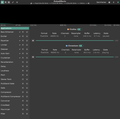
How to setup the audio output to 96KHz or 192Khz
Hi! Chrome based browsers (like chromium or Vivaldi) permit to obtain 96KHz or even 192KHz float 32bit audio output. Firefox stuck at float32le 48KHz. This is not sufficient for me. i have a Linux LinuxMint 20 on a STRIX Z270G audio chip @ 96KHz and headsets like Sennheiser HD650 and GRADO RS1e so able to perfectly perceive the effects of harmonics up to frequency my chip can produce (96KHz band pass).
Question: Is possible in Firefox 78 for Linux to change the max frequency from 48KHz to 96KHz maintaining the float32le setup?
Thank you to all advices!
David
All Replies (7)
Check out this bug, there's a discussion about this issue.
I'll test them despite i'm on pulseaudio (i use ALSA too routed throug pulseaudio) I'll follow my experience here and on link you furnished me. Thank you.
So, no way to have more than 48000 Hz. I read the link @TyDraniu kindly suggested but i didn't find any consisten especially for the pulseaudio configuration. This is my personal pulseaudio config file that override the default one and work perfectly for chromium based browsers:
~/.pulse/daemon.conf
- This file is part of PulseAudio.
- PulseAudio is free software; you can redistribute it and/or modify
- it under the terms of the GNU Lesser General Public License as published by
- the Free Software Foundation; either version 2 of the License, or
- (at your option) any later version.
- PulseAudio is distributed in the hope that it will be useful, but
- WITHOUT ANY WARRANTY; without even the implied warranty of
- MERCHANTABILITY or FITNESS FOR A PARTICULAR PURPOSE. See the GNU
- General Public License for more details.
- You should have received a copy of the GNU Lesser General Public License
- along with PulseAudio; if not, see <http://www.gnu.org/licenses/>.
- Configuration file for the PulseAudio daemon. See pulse-daemon.conf(5) for
- more information. Default values are commented out. Use either ; or # for
- commenting.
daemonize = no
- fail = yes
- allow-module-loading = yes
- allow-exit = yes
- use-pid-file = yes
- system-instance = no
- local-server-type = user
- enable-shm = yes
- enable-memfd = yes
- shm-size-bytes = 0 # setting this 0 will use the system-default, usually 64 MiB
- lock-memory = no
- cpu-limit = no
high-priority = yes nice-level = -11
realtime-scheduling = yes realtime-priority = 9
- exit-idle-time = 20
- scache-idle-time = 20
- dl-search-path = (depends on architecture)
- load-default-script-file = yes
- default-script-file = /etc/pulse/default.pa
- log-target = auto
- log-level = notice
- log-meta = no
- log-time = no
- log-backtrace = 0
resample-method = soxr-vhq
- avoid-resampling = false
enable-remixing = yes remixing-use-all-sink-channels = yes enable-lfe-remixing = yes
- lfe-crossover-freq = 0
flat-volumes = no
- rlimit-fsize = -1
- rlimit-data = -1
- rlimit-stack = -1
- rlimit-core = -1
- rlimit-as = -1
- rlimit-rss = -1
- rlimit-nproc = -1
- rlimit-nofile = 256
- rlimit-memlock = -1
- rlimit-locks = -1
- rlimit-sigpending = -1
- rlimit-msgqueue = -1
- rlimit-nice = 31
rlimit-rtprio = 9
- rlimit-rttime = 200000
default-sample-format = float32le default-sample-rate = 96000 alternate-sample-rate = 48000 default-sample-channels = 2 default-channel-map = front-left,front-right
default-fragments = 2 default-fragment-size-msec = 125
- enable-deferred-volume = yes
deferred-volume-safety-margin-usec = 1
- deferred-volume-extra-delay-usec = 0
Any idea where and what i can modify to test a good configuration that would go over the 48KHz limitation?
This would be interesting for the people using pulseaudio & pulseeffects...
To developers: Any tweak in about:config for this?
Hi! First: Doing some digging i found this: https://developer.mozilla.org/en-US/docs/Web/API/AudioConfiguration
what if i try to test this code (please explain me how to do it since I'm not a developer anymore so if some brave can explain me how to do it would be very appreciated!) changing this line:
contentType : "audio/ogg", // valid content type in contentType : "audio/aac", // valid content type
and the subsequent parameters to match 96KHz float32le?
For simplicity i link here the AAC codec characteristics: https://developer.mozilla.org/en-US/docs/Web/Media/Formats/Audio_codecs#AAC
Second: In about:config i found this boolean paramenter:
media.gmp.decoder.aac
Set = 0. What if i try to set it = 1?
So, this is really incredible. This should be a support site for the best browser ever.
Result: Only one suggestion (thank you for that but old, really old one) And no other that can "support" me as the site said.
Not even a: "you can't go over 48KHz in FF" with no explanation on that!
Please: tell me who to contact directly. I can help too doing tests. Anyone can tell me the address/name(s) of the audio stack maintainer?
Izmjenjeno
Hi, this is a very specific question, so you can only file a new bug on bugzilla.

